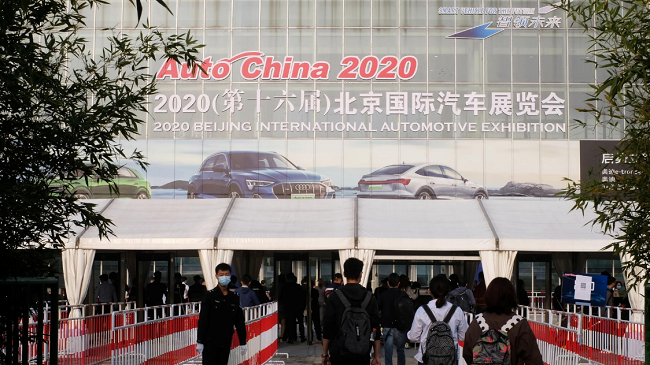Beijing auto show witnesses the return of world's biggest car market

People wearing face masks following the coronavirus disease (COVID-19) outbreak enter the venue of the Beijing International Automotive Exhibition, or Auto China, in Beijing, September 26, 2020. /Reuters
China's auto market has revived from a major pounding caused by the COVID-19 pandemic since early 2020, executives said on Saturday, as a rare in-person auto show was dominated by talk of recovery in the world's biggest car market.
The 2020 Beijing Auto, an annual event showcasing China's rising auto market, kicked off on Saturday in Beijing and will run until October 5.
China's auto market has rapidly recovered from the COVID-19 crash in recent months. The country's auto sales rose 11.6 percent in August from a year earlier, the fifth straight rise after plunging during the lockdown.
"The recovery in the Chinese market has been very remarkable, and our key segments have returned to the previous year's level if not slightly better," Nissan Motor Co. CEO Makoto Uchida told a news conference via a video link from Japan.
"I expect this rebound to continue, but we need to watch for signs of trouble," said Uchida, who announced Japan's second-biggest carmaker would launch a number of new vehicles in China over the next five years as it struggles to return to profit.
Jochen Goller, head of BMW China, said the carmaker expects "single-digit growth" in China this year.
China's top pickup truck maker GAC and Germany's BMW expect sales to grow this year in China, the world's biggest auto market, as consumption revives from COVID-19 lockdowns.
Guangzhou-based GAC, which has partnerships with Toyota Motor and Honda Motor, expects its full-year sales and production to be positive, said general manager Feng Xingya.
GMC aims to spur on overseas sales this year in an effort to ease an overall drop out of the contagious disease.
"Maybe one of the really unique things about the Chinese market is it's so big. And it's a very young market. So the demographic means that the kind of customers that will be buying our products in a few years' time, (the) majority (will be) in their twenties. So we're designing for a very young customer," Phil Simons, Global Design Director and Vice President of Great Wall Motor's Haval, told CGTN.
The executives were speaking at the Beijing International Automotive Exhibition 2020. GAC previously said it aimed to increase sales by 3 percent in 2020.
Germany's Audi AG is in talks with long-term partner China FAW Group Corp about creating a second joint venture to build electric cars on its PPE platform in China, Germany's Automobilwoche reported.
China's typically busy car-buying season, "Golden September, Silver October," is off to a good start, according to preliminary data, with passenger car sales up 12 percent in the first 20 days of September.
Thanks to the better-than-expected market recovery, China's new energy vehicle sales surged 26 percent year on year in August. Sales of passenger vehicle also expanded 8.9 percent last month, registering the fastest growth since May 2018.
"It's still a very clear target from the Chinese central government to reach a certain percentage of (electric) vehicles by 2030 in the market. I believe it will be steady growth, and not only for the electric vehicles, but also for the hybrid electric vehicles. And then further in the outer years, we will see the fuel cell electric vehicles," said Klaus Drobnak, Vice President of Magna Steyr's Asia business in an interview with CGTN.
The rebound means this year's sales will fall less than 10 percent, the China Association of Automobile Manufacturers estimates, better than its May forecast of a 15 percent to 25 percent decline.
Premium vehicles accounted for a record 15 percent of the Chinese market in August, up from around 10 percent for all of last year, the China Passenger Car Association said.
Electric vehicles are also providing buzz to the Beijing show, as a boom in Tesla shares has propelled interest in China.
EV startups such as Nio, Xpeng, Li Auto and WM Motor have together raised more than eight billion U.S. dollars this year.


